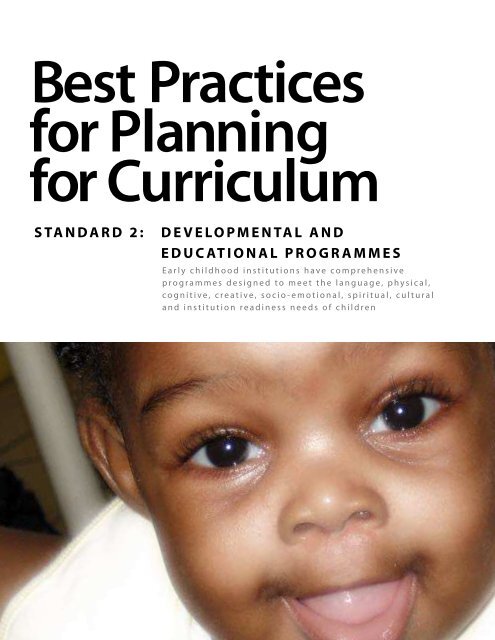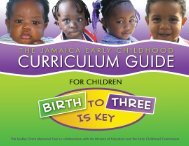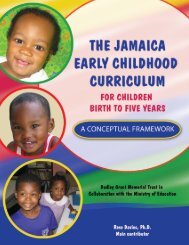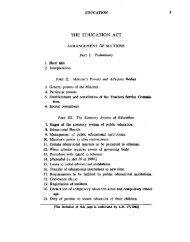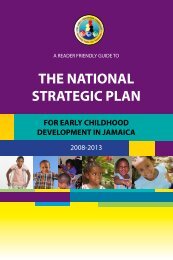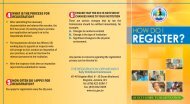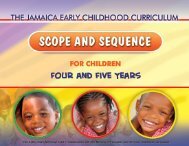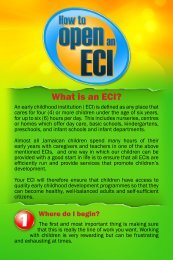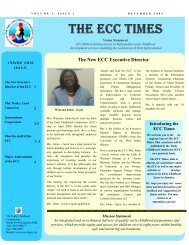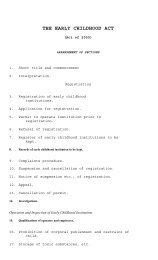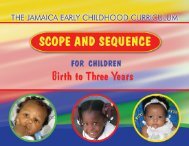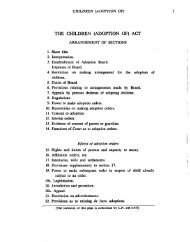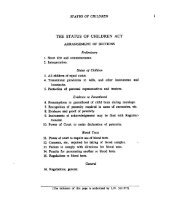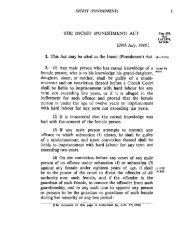Best Practices - The Early Childhood Commission
Best Practices - The Early Childhood Commission
Best Practices - The Early Childhood Commission
You also want an ePaper? Increase the reach of your titles
YUMPU automatically turns print PDFs into web optimized ePapers that Google loves.
B E S T P R A C T I C E<br />
I N A P P R O P R I AT E P R A C T I C E<br />
<strong>Best</strong> <strong>Practices</strong><br />
for Planning<br />
for Curriculum<br />
1<br />
2<br />
3<br />
4<br />
<br />
ECPs recognize that curriculum is embedded in the<br />
environment and plan accordingly. This includes materials,<br />
activities, arrangements, relationships and interactions that<br />
adults provide.<br />
<br />
ECPs plan curriculum that is based on observations of<br />
each child’s developmental level, skills and interests of the<br />
child in consultation with families. Infants are valued as<br />
individuals.<br />
<br />
ECPs plan with a holistic approach to the child including<br />
all domains.<br />
<br />
ECPs understand that the <strong>Early</strong> <strong>Childhood</strong> Institution’s<br />
environment should reflect an understanding that play is how<br />
children learn.<br />
<br />
ECPs do not understand the importance of the<br />
environment on children’s learning.<br />
<br />
ECPs plan for curriculum for the group rather<br />
than the individual. Families are not consulted.<br />
<br />
ECPs focus only on the caregiving aspects of<br />
the child’s day.<br />
<br />
ECPs initiate teacher directed lessons and do<br />
not allow or facilitate play in the environment.<br />
S TA N D A R D 2 : D E V E L O P M E N TA L A N D<br />
E D U C AT I O N A L P R O G R A M M E S<br />
5<br />
<br />
Environments for young children reflect a sensory based<br />
child centred environment.<br />
<br />
Children have limited opportunities for<br />
sensory experiences in the playroom. <strong>The</strong><br />
environment reflects caregiving rather than a child<br />
centred environment.<br />
E a r l y c h i l d h o o d i n s t i t u t i o n s h a v e c o m p r e h e n s i v e<br />
p r o g r a m m e s d e s i g n e d t o m e e t t h e l a n g u a g e , p h y s i c a l ,<br />
c o g n i t i v e , c r e a t i v e , s o c i o - e m o t i o n a l , s p i r i t u a l , c u l t u r a l<br />
a n d i n s t i t u t i o n r e a d i n e s s n e e d s o f c h i l d r e n<br />
6<br />
7<br />
<br />
ECPs observe, plan and evaluate their curriculum in order<br />
to provide sequential and meaningful experiences for the<br />
children moving from simple to more complex experiences.<br />
<br />
ECPs understand the stages of developmental play<br />
levels as children move from solitary to parallel play to co-operative<br />
play.<br />
<br />
ECP planning reflects random activities, some<br />
chosen from activity books, with no thought to how<br />
they meet the needs of the individual child.<br />
<br />
ECPs expect children to interact beyond their<br />
capabilities, eg. Toddlers willingly sharing materials<br />
or favourite toys.<br />
8<br />
<br />
Plan.<br />
ECPs record their observations in an Individual Program<br />
<br />
ECPs make no effort to record their observations<br />
in a written format.<br />
9 Plans are developed for small group and individuals. Plans are developed for the whole group.<br />
10<br />
ECPs plan for both the indoor and outdoor environment.<br />
Many experiences that can be done indoors can be done<br />
outdoors.<br />
<br />
Children rarely are given opportunities to<br />
interact with the outdoor environment, ie. walks,<br />
outdoor activities etc. ECPs are not receptive to<br />
engaging children in the outdoor environment.<br />
11<br />
ECPs understand that children need time for repeated<br />
practice to support their exploration of the world around<br />
them.<br />
<br />
ECPs rush the children through the day without<br />
considering the children’s need to fully explore.<br />
<strong>The</strong> schedule is rigidly adhered to.<br />
12<br />
<br />
Diverse developmentally appropriate props and<br />
materials reflect children’s interests, cultural background and<br />
support the emerging development of language skills. Boys<br />
and girls have the same experiences and opportunities.<br />
<br />
Materials are not suitable for the age group.<br />
ECPs do not understand how to effectively use props<br />
and materials to develop language skills. Gender<br />
stereotyping takes place.<br />
13<br />
14<br />
ECPs encourage the use of standard English while<br />
respecting the primary language of many Jamaican children.<br />
ECPs understand the importance of music, movement,<br />
one to one games, chants etc. in the development of the<br />
whole child.<br />
<br />
<br />
ECPs insist on standard English only.<br />
Children are not exposed to various<br />
interactions with ECPs and are left for long periods<br />
of time on their own.<br />
BIRTH TO THREE YEAR OLDS<br />
23


